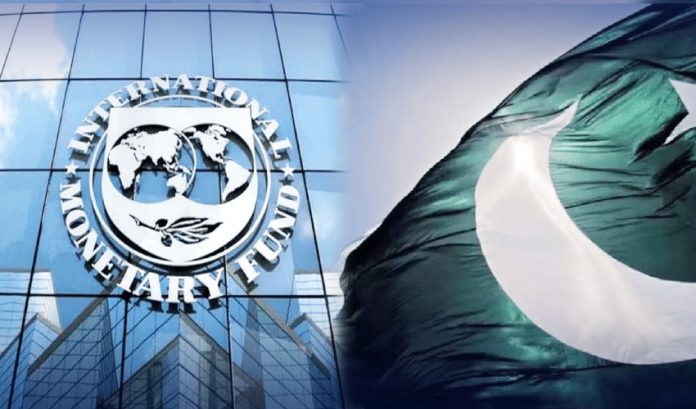——— Maintains to have “narrow mandate on economic issues”
——— ‘Looks forward’ to engaging with new govt
By Ali Imran
ISLAMABAD: The International Monetary Fund (IMF) will support formulating a new economic programme for Pakistan if the new government seeks one, a spokesperson for the lender said on Friday, encouraging fair resolution of all electoral disputes.
The cash-strapped nation grappled with an uncertain Feb 8 election that delayed formation of a coalition government until new Prime Minister Shehbaz Sharif was sworn in on Monday, though a new finance minister has yet to be decided.
“We look forward to engaging with the new government to complete the second review under the current stand-by arrangement and, should the government request, support the formulation of a new medium-term economic program,” the Fund spokesperson said in an e-mail.
The reference was to a $3-billion standby arrangement Pakistan secured last summer from the IMF, though the country has been struggling with record inflation, currency devaluation and shrinking foreign reserves.
The party of jailed former prime minister Imran Khan asked the IMF last month to ensure an audit of the disputed February election before any more bailout talks with Islamabad.
The IMF said that while it did not comment on domestic political developments, it encouraged the fair and peaceful resolution of all electoral disputes, given the importance of the institutional environment for economic stability and growth.
The spokesperson said that “in terms of our engagement with Pakistan, our aim is to support the implementation of strong policies to deepen financial stability, address longstanding economic and underlying balance of payments challenges, and restore sustained and inclusive growth for the benefit of all Pakistani citizens”.
The statement highlighted that sustained growth could be achieved with “stronger public finances, through high quality revenue measures to broaden the tax base while scaling up the support for the most vulnerable, restoring energy sector viability, improving institutional governance and anti-corruption effectiveness”.
It also drew attention to reforms in state-owned enterprises (SOEs), building climate resilience, and creating a “level playing field for private businesses” to promote investment and employment for inclusive growth.
On the basis of these objectives, we look forward to engaging with the new government to complete the second review under the current Stand-by Arrangement and, should the government request, support the formulation of a new medium-term economic program.
The finance ministry and Khan’s party, Pakistan Tehreek-e-Insaf, did not immediately respond to a request for a comment.
Sharif has asked his government to open talks with the IMF for a new programme after clearing the stand-by arrangement.
After a new cabinet is formed, the fund stands ready to send a mission for the second review of the stand-by arrangement, IMF communications official Julie Kozack told a briefing.
“The focus, therefore, is currently on completion of the current Stand-By programme, which ends in April 2024. We look forward to working with the new government on policies to ensure macroeconomic stability,” IMF Director of Communications Julie Kozack told journalists at a news briefing on Thursday.
Kozack noted that the IMF Executive Board had approved the first review of Pakistan’s Stand-by Arrangement (SBA) on January 11, with disbursements totaling approximately $1.9 million.
The SBA aims to stabilise the economy, particularly focusing on safeguarding vulnerable segments of the population.
Highlighting the caretaker government’s efforts, Kozack praised their commitment to fiscal targets, the protection of social safety nets, and a tight monetary policy to control inflation.
She also acknowledged timely adjustments in tariffs to enhance the energy sector’s viability.
Looking ahead, Kozack emphasised the IMF’s readiness to conduct a mission for the second review of the Stand-By arrangement after the formation of a new cabinet. The current Stand-By programme concludes in April 2024, and the IMF anticipates working closely with the new government to ensure macroeconomic stability.
Responding to a question regarding political instability, Kozack refrained from commenting on politics. Instead, she reiterated the IMF’s commitment to collaborating with the new government and expressed optimism about fostering stability for the benefit of the people of Pakistan.
Last month, the IMF had stated that it is looking forward to engaging with the new government on policies to ensure “macroeconomic stability and prosperity for all of Pakistan’s citizens”.
The development came a day after PTI Senator Ali Zafar told reporters that a letter would be sent from incarcerated party founder Imran Khan to the international lender urging it to call for an independent audit of the Feb 8 general elections before it continues talks with Islamabad.
Zafar said the IMF, the European Union and other organisations had a charter that stated that good governance was needed for working in the country or giving a loan.
“The most important condition for good governance is democracy,” he said, adding that the people’s mandate was stolen “in the darkness of the night” during the Feb 8 polls.
He said that if elections were not free and fair, any organisation would avoid giving a “loan” to such a country. “Because that loan will further burden the people,” he said.




